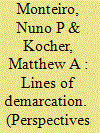| Srl | Item |
| 1 |
ID:
150500


|
|
|
|
|
| Summary/Abstract |
Qualitative historical knowledge is essential for validating natural experiments. Specifically, the validity of a natural experiment depends on the historical processes of treatment assignment and administration, including broader macro-historical dynamics. But if validating a natural experiment requires trust in the ability of qualitative evidence to establish the causal processes through which the data were generated, there is no good reason for natural experiments to be considered epistemically superior to historical research. To the contrary, the epistemic status of natural experiments is on a par with that of the historical research on which their validation depends. They are two modes of social-scientific explanation, each with its own pros and cons; neither is privileged. We illustrate this argument by re-examining an important recent contribution to the literature on violent conflict: Ferwerda and Miller’s 2014 natural experiment estimating the causal effect of the German decision to devolve authority to the Vichy French government on violent resistance during World War II.
|
|
|
|
|
|
|
|
|
|
|
|
|
|
|
|
| 2 |
ID:
175626


|
|
|
|
|
| Summary/Abstract |
This paper shows that, during 1991–1992, the George H.W. Bush Administration settled to pursue NATO enlargement in order to ensure both stability in and influence over Europe. Both were necessary subsidiary objectives towards achieving long-term security aims and the medium-term goal of furthering American prosperity. Bush officials concluded that European instability, protectionism, and self-absorption could menace US-led economic globalization. Anchoring NATO at the centre of the post-Cold War European order was seen as the best available response. NATO enlargement would alleviate European security concerns; prevent the emergence of regional security structures that endangered the Alliance; and provide the leverage Washington needed to encourage European participation in America’s global economic order.
|
|
|
|
|
|
|
|
|
|
|
|
|
|
|
|
| 3 |
ID:
079378


|
|
|
|
|
| Publication |
London, Facet Publishing, 2007.
|
| Description |
xvii, 329p.
|
| Standard Number |
9781856045452
|
|
|
|
|
|
|
|
|
|
|
|
Copies: C:1/I:0,R:0,Q:0
Circulation
| Accession# | Call# | Current Location | Status | Policy | Location |
| 052690 | 020.72/PIC 052690 | Main | On Shelf | General | |
|
|
|
|